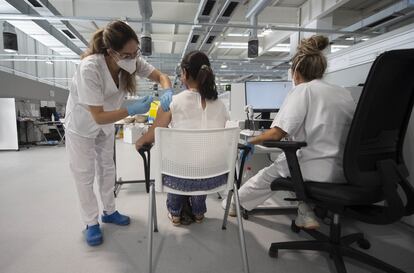Coronavirus incidence in Spain rises another 32 points in a day, with 26,390 new cases detected
Catalonia, one of the worst-affected regions right now, is seeking approval for a curfew in 158 municipalities. Meanwhile, 47% of the population now has been fully vaccinated against Covid-19

The 14-day cumulative number of coronavirus cases per 100,000 inhabitants continues to rise in Spain, going up a further 32.75 points in 24 hours according to Wednesday’s Health Ministry report to reach 469 – a level last seen in February during the third wave of the virus. The incidence, Health Minister Carolina Darias pointed out on Wednesday, has risen from 225 in just a week during the fifth wave.
The ministry reported 26,390 new cases, and added 10 Covid-19 victims to the overall death toll. In total, 4,041,474 coronavirus infections have been formally recorded since the pandemic took hold in Spain, while 81,043 people have died after testing positive for Covid-19.
In terms of age groups, the incidence continues to be highest among those in the 20-29 age group, with 1,508 cases per 100,000 inhabitants over the last 14 days. In the 12-19 bracket, the incidence is 1,252. “Given that the incidence is linked to younger people, the rise in hospitalizations has been minor,” Darias added on Wednesday. “But there is a risk that they could end up being affected. We can’t rule out serious cases among young people,” she said.
The worst-affected region, according to Wednesday’s report, is Catalonia, with an incidence of 1,252 cases per 100,000 inhabitants over the last 14 days. Castilla y León is next, with 779 cases, followed by Navarre with 700. Cantabria, Asturias and Aragón are the other three territories with an incidence over 500.
Vaccination campaign
The Health Ministry also provided an update on Thursday on the country’s Covid-19 vaccination drive. A total of 48,911,460 vaccine doses have so far been administered in Spain, which is 91% of the total received. So far, 60% of the population – 28,475,900 people – has received the first dose of one of the Covid-19 vaccines being used, while 47.4% – 22,511,734 people – now has the full protection offered by the shots.
Given the rising incidence of the coronavirus across Spain, several of the country’s regions – which are in charge of their healthcare systems, vaccination drives and coronavirus restrictions – are opting to tighten measures aimed at containing the spread of the virus.
Catalonia, for example, is seeking judicial approval for a nighttime curfew in 158 municipalities. The restrictions will be in place for seven days, according to Catalan premier Pere Aragonès, with the option to extend this time period. The measure will affect all municipalities with more than 5,000 residents and with a seven-day incidence above 400 cases per 100,000 inhabitants. The regions must seek the approval of the courts for measures that limit fundamental rights such as freedom of movement.
Unvaccinated patients
Also in Catalonia, on Wednesday the health authorities released data about current Covid-19 patients. According to the information, 77.6% of those currently in intensive care units (ICUs) have not been vaccinated. The region has opened up the vaccination campaign to all people over the age of 16. The Catalan health department does not know, however, how many of the ICU patients were unwilling to get vaccinated or simply had not yet had access to their shots. The majority of the 219 ICU patients are over 30, according to the public health secretary Carmen Cabezas. Vaccinations have been available to this age group for several weeks now.
In the Basque Country, regional authorities have agreed to prohibit meetings in the street between midnight and 6am, except for gatherings by people who live in the same household. The decision was taken after the incidence of the coronavirus rose to 377.87 cases per 100,000 inhabitants over the last 14 days.
Home testing
Home testing kits are soon to arrive in Spanish pharmacies, after the Health Ministry said it will take a draft decree to the Cabinet for approval that would remove the need for a medical prescription to access such tests. Health Minister Carolina Darias said there is a need to “increase diagnostic capabilities” in order to control the spread of the virus.
But experts have raised doubts about the viability of the measure. Epidemiologists warn that there is a need to officially monitor the results of such tests and say that free access to such kits could give the public a false sense of security.
The Health Ministry is yet to confirm whether there will be a protocol to monitor the results of such tests and whether they will be incorporated into the official statistics in Spain. What has been agreed with the regions, however, is that any positive results will have to be confirmed with a more accurate PCR test.
Based on reporting by Jessica Mouzo and Bernat Coll.
English version by Simon Hunter.
Tu suscripción se está usando en otro dispositivo
¿Quieres añadir otro usuario a tu suscripción?
Si continúas leyendo en este dispositivo, no se podrá leer en el otro.
FlechaTu suscripción se está usando en otro dispositivo y solo puedes acceder a EL PAÍS desde un dispositivo a la vez.
Si quieres compartir tu cuenta, cambia tu suscripción a la modalidad Premium, así podrás añadir otro usuario. Cada uno accederá con su propia cuenta de email, lo que os permitirá personalizar vuestra experiencia en EL PAÍS.
¿Tienes una suscripción de empresa? Accede aquí para contratar más cuentas.
En el caso de no saber quién está usando tu cuenta, te recomendamos cambiar tu contraseña aquí.
Si decides continuar compartiendo tu cuenta, este mensaje se mostrará en tu dispositivo y en el de la otra persona que está usando tu cuenta de forma indefinida, afectando a tu experiencia de lectura. Puedes consultar aquí los términos y condiciones de la suscripción digital.









































